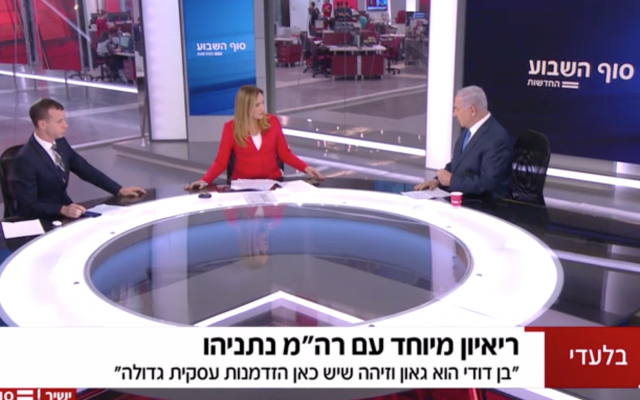Sparring with Channel 12 in first TV interview in 4 years, Netanyahu denies wrongdoing in submarine affair; promises he won’t legislate to protect himself from prosecution

In a rare television interview on Saturday night, Prime Minister Benjamin Netanyahu lashed out at his main political rivals in the upcoming national election, accusing them of “a campaign of lies,” of issuing “a blood libel” against him, and even of “endangering the security of the State of Israel.”
Netanyahu delivered his broadsides against the Blue and White party head Benny Gantz, members Yair Lapid, Gabi Ashkenazi and Moshe Ya’alon, and the very channel on which he appeared – Channel 12 – all while denying any wrongdoing in a corruption case involving submarine purchases that has snagged close associates.
The 35-minute interview, Netanyahu’s first with a major Israeli television outlet in at least four years, covered a wide range of issues and came just weeks before Israelis head to the polls on April 9. Netanyahu apparently arrived at the TV studios unannounced; anchor Keren Marciano welcomed him by saying he had “succeeded in surprising us.”
The interview also came a day after the prime minister, contending with fresh suspicions involving him, announced in a video on Friday that he would sue his political opponents for slander after Ya’alon, who once served as defense minister under Netanyahu, made the accusation of possible “treason” in relation to the case. A number of close associates, but not the premier himself, are suspected in a graft scheme in the multi-billion shekel state purchase of naval vessels from Germany.
Gantz had earlier this week called for a state commission of inquiry to probe the so-called submarine affair, after fresh allegations emerged that Netanyahu may have earned millions of shekels off the deal.
The claims relate to the revelation that Netanyahu once held shares in Texas-based SeaDrift Coke, a company later acquired by a supplier of ThyssenKrupp, the German shipbuilder at the center of the corruption probe.

Opponents have alleged a possible conflict of interest on the part of the premier. His apparent failure to disclose his investment to state authorities in the past is now being examined, with prosecutors said to be considering a criminal probe. According to a Channel 13 report Thursday, prosecutors suspect Netanyahu misled the State Comptroller’s Office on his financial assets.
Ya’alon’s charge of treason appears to have been directed at a subplot in the affair — Netanyahu’s green-lighting of Germany’s sale of submarines to Egypt, which critics have said potentially puts national security at risk. Lapid has also said in the past that Netanyahu approved the deal between Germany and Egypt, without notifying then-defense minister Ya’alon. A former top defense official reportedly recently testified that he too was caught off guard by the move.
Speaking on Saturday at the end of the weekly news broadcast, Netanyahu said he decided to appear on Israeli television to set the record straight and “shatter the wave of lies that Gantz, Lapid, Gabi Ashkenazi and Moshe Ya’alon are spreading.”
Netanyahu reasserted that he bought shares of SeaDrift in 2007 when he was not a member of the government and that he had consulted the proper authorities and received the all-clear from the State Comptroller.
Reports this week suggested Netanyahu made a return of over 700 percent on the stocks in SeaDrift, having bought them for $400,000, before selling them in 2010 to his cousin, US businessman Nathan Milikowsky, for $4.3 million. That stark difference has led to speculation of possible impropriety in Netanyahu’s financial dealings.
Netanyahu said Saturday that he invested $600,000 of his own money and that SeaDrift had “nothing to do with submarines.”
The prime minister defended the deal, saying the company had great technology and potential and that his cousin was a “genius who recognized a good business opportunity.”
“This happened because I understand economics, unlike Gantz whose company went bankrupt [Gantz was chairman of a cybersecurity firm that folded], Ashkenazi and Lapid who said he understands nothing about economics. Don’t blame me cause I succeeded in business,” he told his Channel 12 interviewers.
“I sold every share I had 1.5 years before the first submarine was bought. The charge that I made money from the submarines is a straight-out lie, I didn’t make a single shekel from the submarines because I didn’t invest a single shekel,” he charged.
Regarding the green-lighting of the sale of submarines to Egypt, which critics have said potentially puts national security at risk, Netanyahu hinted he could not divulge certain details regarding the case and said his opponents were taking advantage of that fact.
“They are trying to force me to divulge a state secret that would endanger [the country]. They are the ones endangering the State of Israel,” he accused.
Netanyahu said “whoever needed to know, knew,” and that a defense minister, in this case Ya’alon, “doesn’t need to know about such a thing.”
“In the State of Israel, there are secrets that only the prime minister know and a handful of others.”
The prime minister said Egypt would have bought the submarine from elsewhere and that he only okayed it for security reasons. He denied any connection to financial interests or shares, calling that allegation a “terrible blood libel.”
Further attacking Gantz, Netanyahu claimed the fresh wave of allegations came in response to the alleged “Iranian hack” of the former army chief of staff’s phone, which collected purportedly compromising information on him.
“They started these lies at the time,” Netanyahu said. “The question is what was in the phone. The correct course of action would have been to be straightforward about the hack, not start spreading lies.”
If Gantz would just “come clean” about what was on his phone, there would no possibility for the Iranians “to extort him,” said Netanyahu.
The centrist Blue and White party has accused Netanyahu of orchestrating the leak in an act that it said constitutes “the most severe breach of trust,” charging that “there is a series of indications that trace a path for the ‘leak’ to a very specific office in Jerusalem.”
In his interview on Saturday, Netanyahu stated that he would be the one to form the next government with his existing political partners. “I don’t see the possibility of Gantz or Lapid being in it,” he said.

The prime minister also said he would not pursue legislation granting himself immunity from prosecution if re-elected. Asked, if re-elected, whether he would seek to advance legislation, or any other procedure, that would prevent him from being indicted, Netanyahu replied, dismissively, “What? Out of the question. The answer is no.”
What would prevent his prosecution, he said, “are the facts [of the cases] themselves.”
Netanyahu was pressed repeatedly on the issue, with Marciano asking him specifically whether he might support some version of the “French law” whereby as a serving prime minister he could not be prosecuted, or any other means to give himself immunity. In response, Netanyahu said, “I haven’t got involved with this, and I don’t intend to get involved with this.” And if his MK loyalists sought to advance any such a move? Netanyahu said “the fact is that they did” try to advance that kind of legislation, “and I very quickly told them to stop.”
Pressed again to pledge that he would not seek such legislation, or benefit from others doing so, Netanyahu first said “I don’t know” and then said, “I haven’t got involved with this… This is the first time I’ve been asked about this. You’re asking me… I’m telling you, I haven’t got involved with this… and I don’t believe I will get involved with this.”
Last month, Attorney General Avichai Mandelblit announced, separately, his intention to indict Netanyahu on charges of bribery fraud and breach of trust in three other cases. The prime minister denies the allegations, and says the cases are part of a political witch hunt designed to oust him, involving the left, the media and the police pressuring a weak attorney general.
While a sitting Israeli prime minister has never been this close to indictment before, Netanyahu is not obligated to resign at this stage. The planned indictment is still subject to a hearing, during which Netanyahu can plead his case before formal charges are filed.
Netanyahu said Saturday that most of the allegations against him have “fallen apart and the rest will [also fall apart] soon.”
The prime minister at certain points during the interview sparred with his interviewers, accusing them of backing his political opponents and of being “soft” on them during previous interviews on the channel.

He also charged that the channel was engaging in “satire,” and not real news, with its coverage of him and his family.
“I’m flesh and bones, when they attack my wife, when they attack my kids, it affects me,” he said.
Blue and White released a statement shortly after the interview aired, calling Netanyahu “hysterical.”
“Again and again he changes his version [of events], avoids tough questions and continues to slander,” the statement said.
The party also said Netanyahu did not provide sufficient answers in the interview on how he reportedly earned over $4 million on the stock sale or why he gave his approval for Germany’s ThyssenKrupp to sell Egypt submarines without the knowledge of top security officials.
“He’s going to lose [the elections],” Blue and White said.
As reported by The Times of Israel
